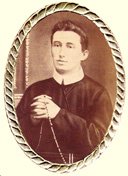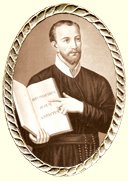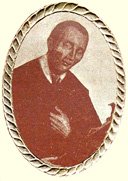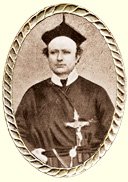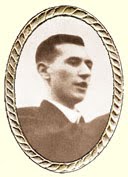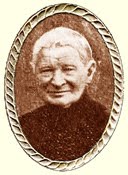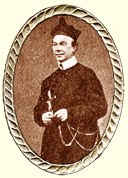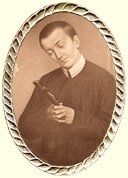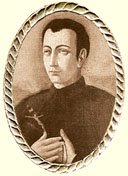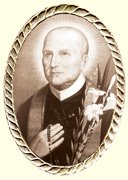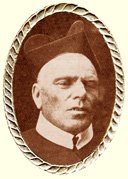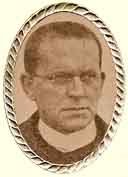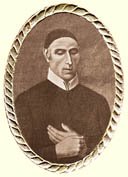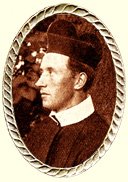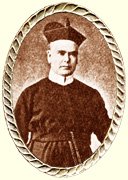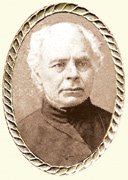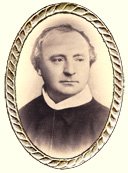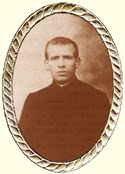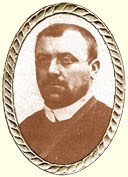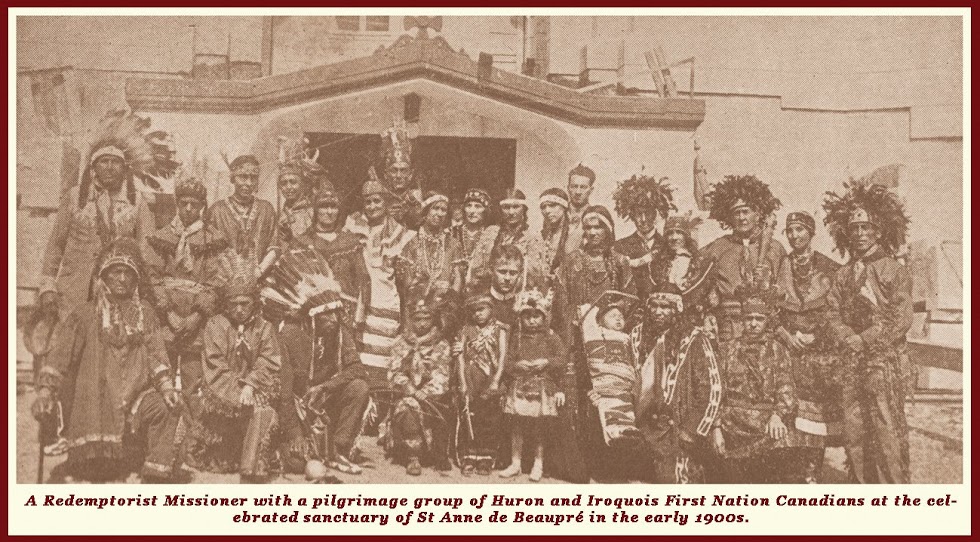Rev. Fr Michael Geoghegan, C.SS.R. (1837-1900)
 Father Geoghegan was born on the 3rd of March 1837, near Gort, in the diocese of Kilmacduach. As a child he had learned some Irish, and later on, while attending a school in Gort, having lodged at a house where Gaelic was much spoken, he greatly improved his knowledge of the language. Having a vocation to the priesthood, he was sent in due course to Maynooth, where he pursued his Ecclesiastical studies for several years. Feeling that God had called him to the religious state, he left Maynooth in the May of 1862, and in the following October, was received into the Congregation of the Most Holy Redeemer as a candidate for the Novitiate.
Father Geoghegan was born on the 3rd of March 1837, near Gort, in the diocese of Kilmacduach. As a child he had learned some Irish, and later on, while attending a school in Gort, having lodged at a house where Gaelic was much spoken, he greatly improved his knowledge of the language. Having a vocation to the priesthood, he was sent in due course to Maynooth, where he pursued his Ecclesiastical studies for several years. Feeling that God had called him to the religious state, he left Maynooth in the May of 1862, and in the following October, was received into the Congregation of the Most Holy Redeemer as a candidate for the Novitiate.After the year of novitiate, he made his religious profession early in 1864. As he was not yet a priest, he continued his study of Theology and other sacred sciences amongst our students on the Continent. The 23rd of October, 1865, saw him ordained Priest, and in the following year he began his course of apostolic work, at Clapham, London.
The missionary career now begun, was to last for almost thirty-five years. During this long space of time he was much engaged in external work, and was attached in succession to each of our houses in Ireland, England, and Scotland. He laboured in almost every quarter of the three Kingdoms, taking part in several hundred missions and retreats. It is worthy of notice that during many of these missions given in the large centres of England and Scotland, he frequently preached Irish sermons, and heard many confessions in Irish. Amongst his apostolic works must also be numbered many retreats conducted for the clergy and for religious of both sexes.
When a young man he possessed a powerful, athletic frame, but as time wore on he suffered from repeated attacks of illness. At one time a weak chest gave him much trouble, at another he was afflicted with a stroke of paralysis, while for many years before his death he was suffering from the illness that finally brought him to the grave. Yet in spite of weakness and physical unfitness for work, he laboured without intermission, for he would never knowingly waste a moment of time.
From boyhood he had a good knowledge of Irish, and great was his love for the native language. As we have mentioned, he often preached Irish sermons in England and Scotland. At home he gave missions in many places where Irish was the language largely, and in some parts almost exclusively spoken; here, too, he would preach and hear confessions in his native tongue. In the western parts of Ireland, being himself a native of the west, he was most easily understood, his Irish being much admired by priests and people. In Munster and Donegal, moreover, he often preached to attentive Irish congregations. His last mission was at Spiddal, Co. Galway; at this time his health was almost completely gone.
Each day while the work of hearing the confessions was being carried on and large numbers were anxiously waiting at the confessionals, Father Geoghegan used several times to address the people in Irish, giving them instructions on the Sacrament of Penance. It was remarked that on these occasions when those who were in the church saw him prepared to speak to them, they eagerly gathered round him and listened to his words with evident delight.
Father Geoghegan had a great love for his native language, but this, like all that entered into and formed part of his life, was grounded on his love for God and for the salvation of souls. He used to complain that the secular was so far in advance of the religious side of the Irish Language Revival, and that no one seemed to write for the Catholic people in their native tongue. It is, however, a pleasure to be able to record that since Father Geoghegan’s death, Father Peter O’Leary, the much respected and beloved Parish Priest of Castlelyons, has published many religious works in Irish.
Father Geoghegan, himself, wishing to give some practical effect to his desires, went to work, some five or six years before his death, to study the grammar and literature of the language, in order to fit himself to write some of those religious books he so longed to see in the hands of Irish-speaking Catholics. With immense labour he compiled from his reading, an Irish-English and English-Irish dictionary in two large manuscript volumes. He composed an examination of conscience for confession, in the form of questions and answers. He had, moreover, set before himself the task of writing a volume of sermons for each Sunday in the year, which might be a help to those anxious to preach in Irish, but weakened by illness, he only finished the outline of some half a dozen sermons. It had long been his wish to translate sacred hymns into Irish. About ten years ago, when some of our Fathers were giving a mission at Rosmuch, County Galway, where all the sermons and instructions were in Irish, Father Geoghegan sent them his first two humns: “Look down, O Mother Mary,” and “God of Mercy and Compassion.” These the Fathers sang, night after night, with the people, and a great impression was produced on the congregation, especially by the hymn in honour of the Blessed Virgin.
A piece in verse written by Father Geoghegan is given below. It recalls the memory of a poor western peasant whose favourite expression was: “May I see God!” All through life he used these words with such frequency that he had become remarkable amongst his neighbours. Father Geoghegan, in his boyhood, had known and admired this simple poor man, and the impression made on him lasted all his life.
By the time of his death he had translated many hymns into Irish, having continued this work up to the very end. A few days before he died he asked a confrere to bring from the library a copy of the “Eucharistic Verses”, by Father Matthew Russell, S.J. He said that he always had a desire to translate some extracts from that book. He then selected a short piece of sixteen lines; the idea expressed was, of labour being over and eternity at hand. Father Geoghegan translated the passage roughly at first and then set to work at a finished copy. He had finished twelve out of the sixteen lines, but his strength was fast failing. He was sitting up in his bed with the paper in one hand and the pencil in the other; when he had completed the twelfth line, handing the manuscript to one of the Fathers, he said: “Some one else must finish this, I can do no more.” He lay back and in less than forty-eight hours he was dead.
A few weeks before his death, Father Geoghegan one day sent for one of the Fathers, who like himself, was a lover of Irish, in order to make known to him a practice that prevailed in his native parish when he was a boy. On Sundays, before Mass, the parish clerk used to stand within the altar rails and read for the people a spiritual book in Irish; at one time it was the Catechism, at another the “Following of Christ.” Remembering the good effect of this upon the Faithful, Father Geoghegan suggested that, where it was possible, a similar practice should be introduced. Such a custom, he was convinced, would do much good for souls, and would, moreover, considerably help the revival of the Irish language.
The Father who acted as Father Geoghegan’s director, and in whom he had great confidence, wrote down some notes on his last illness; from these we quote the following:-
“He, Father Geoghegan, made a most thorough preparation for death. For about four months before his death he went to Confession every night. He was most anxious to keep the Rule, as far as he was able, sending frequently for me when difficulties occurred, to get directions and advice as to what he should do. Though weak and very languid he used to follow the general order of the day. He was above all most particular about making the good intention every morning of offering all his acts to God, and this intention he would renew many times during the day.
“He prayed for recovery up to about two months before the end, then he ceased to pray for health. It was evident that his motive in desiring a restoration of health had been that he might be able to work for souls. At the time referred to, he one day sent for me and asked whether I thought it would be better for him to pray for recovery or to make acts of desire to go and see God. He was quite resigned to do either.
“He gave me most minute particulars as to how he was to be assisted when dying. He wished acts of confidence in God, and of offering of self and short invocations to Mary to be suggested. During his illness he returned to this subject over and over again always mentioning details so that I might be well versed in what he needed.
“He was constantly making acts of resignation to the Holy Will of God. He did this all through his illness, but especially towards the end. He was anointed three times, and twice at least, at his own request. The last time I spoke to him was on the Monday night before he died. After 9 p.m. he began to suffer great pain and Father Rector asked me to remain all night with him. As I read my office in the room, I heard him moan and pray aloud. About 11 o’clock he got some relief from the pain, and as was usual with him, began to thank God for his Goodness. I then heard his confession for the last time. He told me that if he became speechless, I should know that he wished for absolution when he bowed his head.
“I spoke to him some words of comfort and of the joy of soon meeting Jesus, Mary, and Joseph, and St. Patrick; he added, ‘Yes, and all the Angels of God.’ About 2 o’clock, Father Rector said Holy Mass, and gave him Our Divine Lord in the Holy Communion for the last time. Soon after this he lapsed into a state of unconsciousness, and quietly passed away about a quarter to five o’clock in the morning. The Holy Mass was at once begun, and all the Masses of that day were offered for the repose of his soul."
An extract from a letter of the Most Rev. Dr. McCormack, Bishop of Galway and Kilmacduach, will make a fitting close for this short sketch. His Lordship wrote as follows, on learning the news of Father Geoghegan’s death:-
“I hasten to convey the expression of my deep sympathy with you and your confreres on the death of dear Father Geoghegan. He was a most exemplary missioner, always devoted to his hard work, ever untiring, ever unsparing of himself, and filled with priestly zeal for the salvation of souls.
“He always seemed to me one of those holy men who, when God’s work is in question, never think of their own labour, even when they might reasonably and legitimately seek respite. Like his holy Father and Founder, he has worked to the very last, as long as the poor hand was able to hold the pen. May his good, simple, saintly soul, soon, if not already, be in eternal rest!” †





















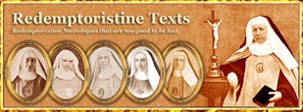
.jpg)









